Schlagwort: ‘Spain’
My Internship at the EHU Bilbao
- Biology M. Sc.
- Spain, Bilbao
- Universidad del País Vasco (UPV)/ Euskal Herriko Unibertsitatea (EHU)
- 07/2024 – 09/2024
When I reached out to the Cell Communication and Transcription Lab at EHU Bilbao for a placement, I was quickly connected with my future supervisor. We arranged an online Zoom meeting, and from the start, I felt genuinely welcomed. She was incredibly helpful in organizing my stay, handling all the necessary university paperwork, and went out of her way to ensure everything was in place. It was at that moment I knew I would be well-supervised, and that this internship would be a great success.

© Jule Wahl
Although the university is located far outside the city, I was advised to find accommodation in the city center for better social connections and public transportation. I found my room on Idealista, a popular platform for finding apartments in Spain. For me, finding a reasonably priced room in a shared apartment near the river was relatively easy, but knowing at least some Spanish greatly helps in communicating with landlords, who often speak only Spanish. I ended up living with a girl from Catalunya, a girl from Peru, and one from France. Two of them were students, and the other was working. We got along really well, and they made every effort to make me feel welcome and comfortable in the flat. While we didn’t spend much time together in the end, it was still nice getting to know them!
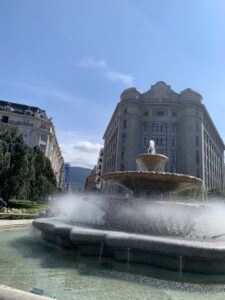
© Jule Wahl
My first impression of the city was different from what I expected of a typical Spanish city. This is because Bilbao is not quite Spain—it’s the Basque Country, something I later learned is very important to acknowledge. The architecture reminded me more of Central Europe, with modern and stylish buildings. The Nervión River flowing through the city provides a contrast to the otherwise dense urban landscape, creating a special atmosphere, especially at night when the lanterns reflect off the water. I really enjoyed taking walks by the river towards the old town, chatting with friends or responding to voice messages, as there are parks and green spaces along the way. The old town (Casco Viejo) is beautiful to explore and becomes even more vibrant at night. Every day of the week, you can find people enjoying drinks and Pintxos, the Basque version of tapas. My favorite Pintxos were the mini burgers and slices of baguette topped with various salads.
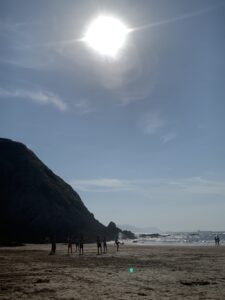
© Jule Wahl
Nature in Bilbao is lush and green, thanks to the high humidity and frequent rain. The surrounding hills and mountains offer excellent hiking routes with stunning scenery, such as the trails around Trapagaran. About 40 minutes from the city center by public transport, you’ll find large, beautiful beaches with breathtaking cliffs and sunsets. My favorite was Sopelana Beach, which I highly recommend for a spectacular sunset.
Because my stay coincided with exam season and the university’s semester break, there weren’t many students on campus, and the Erasmus students left a week after I arrived. However, I was part of the Happy Erasmus WhatsApp group for Bilbao, which allowed me to join their last gathering. Not knowing anyone in the city, I simply asked in the group chat if anyone was going out that night and if I could join them. A really nice Czech girl replied, and we met up with her group for a pre-party. We clicked instantly and had a fantastic night, which ended with a spontaneous swim in the sea. We went to a techno club called Sonora, which was a nice change from the usual bachata and salsa music. In general, Bilbao doesn’t have many clubs; it’s more common to go to small bars, particularly in Casco Viejo, where you can dance to loud music. If you’re looking for an experience full of partying and socializing with Erasmus students, I recommend coming during the semester when there are more activities and it’s easier to meet people. I also attended some language exchange meetings that I found on the Meetup app (which I highly recommend for meeting new people in a new city!) and created a Bumble BFF account specifically to find friends.
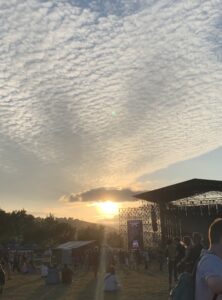
© Jule Wahl
During my stay in Bilbao, I was eager to follow the Euro 2024 football tournament in Germany, especially in the company of others. I heard about a German bar that always showed football matches, so I went there for the Germany games. I struck up a conversation with a group of young Germans, and we immediately hit it off. They were taking a language course in Bilbao, and from then on, we watched all the games together. The bar is also worth visiting—the owner is very friendly, and you can speak German with him! While I didn’t try the food, I heard great things about it. We watched the final at a public viewing event in Parque de Doña Casilda, which culminated in Spain’s victory. I also attended the popular BBK Bilbao festival, held on a hill just outside the city. It was easy to get there by bus, and we walked back afterward. I asked in the Erasmus WhatsApp chat who was going and if I could join, as I didn’t want to go alone. Fortunately, a German guy replied, inviting me to join him and his friends. We had an amazing evening, with the highlight being dancing to Jungle’s live performance. Bilbao and the surrounding towns have a lot to offer young music lovers, with numerous street fiestas and concerts during this time of year.
I highly recommend exploring the various towns around Bilbao, such as Portugalete, Santurtzi, Getxo, and Muskiz, which offer beautiful nature and charming towns. A day trip to the stunning city of San Sebastián is also well worth it, and the bus tickets are quite affordable! You can also easily travel to Madrid, Santander, Zaragoza, Vitoria-Gasteiz, Burgos, and other cities by bus or train, and if you prefer to fly, there are plenty of low-cost options to explore all of Spain.
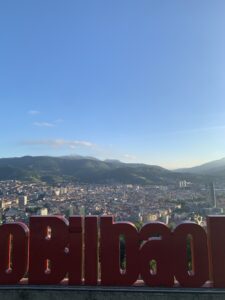
© Jule Wahl
My academic experience was also incredibly valuable. I learned a lot of methods and concepts related to working with mammalian cells and maintaining them in culture. The atmosphere in the lab was everything I could have hoped for, helping me realize what aspects are important to me in a working environment. I made many friends and colleagues who enriched my network, and I plan to stay in touch with them. This experience made me more open to meeting new people, finding ways to connect, and getting along with them right away. I’m certain it shaped my character in ways that only an experience abroad can.
My Erasmus Traineeship in Valladolid
- Medicine
- Spain, Valladolid
- Universidad de Valladolid
- 01/2024 – 06/2024
My name is Felix and I’m a medicine student from Aachen, Germany. This year I spent 6 month of my practical year taking part in a hospital Internship at the University of Valladolid in Spain.
Preparation
As for the preparation I first reached out about a year before my stay to the Erasmus coordinator and the dean of the Faculty of Medicine at the university. Although sometimes hard to reach, he will eventually answer you and help you with whatever request you might have. He recommended me to contact two other doctors to organise the different parts of my internship. Eventually I organized my stays with the respective heads of the different departments and presented my final rotation in internal medicine and surgery to these two doctors to get their confirmation.
Arrival and Organisation
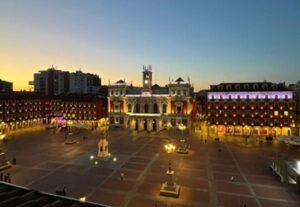
©Jan-Felix Wolters
I arrived 1 week prior to the start of my internship, which gave me time to visit the international office and organize the formalities. Although I could not be matriculated without taking any assignments, they were very helpful and worked out a way to provide me with the student badge. That way I could take part in the university sport and other programs, such as the GUM, which is a group of students and other people that go on hikes every 2nd Sunday throughout the entire year. In order to get set up for the hospital, I had to go to the Dean’s office, where the friendly employees helped me go through the process of registering for my internship, which included receiving my nametag and clothes for the hospital. For this process a “Certificado de los delitos sexuales” is necessary. This was very easy to get at the local state’s office. I got a date within 3 days and it only took them 1-2 days to get the necessary information from Germany and to send me the certificate via email. All in all the people were always very friendly and helpful which made the process easy, even though some things couldn’t be resolved right away.
Accommodation
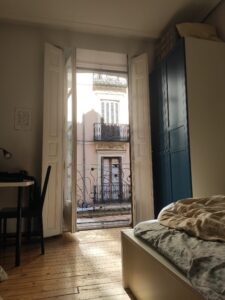
©Jan-Felix Wolters
Accommodations in Valladolid are surprisingly cheap and easy to find. Rooms in a shared flat generally range between 180 and 350€. Studios aren’t much more expensive either. The main website used is Idealista, but you can also find rooms through facebook (watch out for scammers). I wanted to get to know people which is why I was looking for a flatshare. After only about 3 days of search I found a very nice room in a central apartment right next to the main shopping street. Although not very good equipped and a bit lived through, the apartment was very nice and that way I got to know other international people. It is worth to mention that in Valladolid (and other Spanish cities from what I’ve heard) it’s common for landlords to take away money from your bond, or even the whole bond without indicating a reason. It seems to be a way of making extra money off international students, who usually can’t do much about it. After this happened to some of my roommates as well, I decided to not pay my last months rent and leave the bond to the landlord, which is a common strategy.
The City
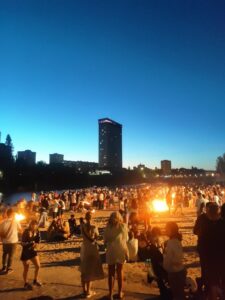
©Jan-Felix Wolters
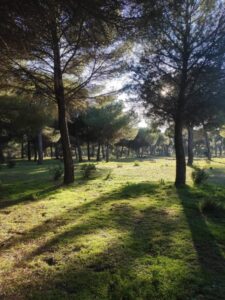
©Jan-Felix Wolters
Valladolid wouldn’t have been the city of my choice if it weren’t for my girlfriend, who is from there. My expectations weren’t very high, and got easily excelled by this mid-sized city in central Spain. It has a beautiful historic centre and even an artificial beach at the riverside. Located about 1 hour from Madrid by train and 2.5 hours from the north coast by car, the city is particularly well located in Spain. It gives you the possibility to regularly visit the capital or to rent a car for a cheap price and spend the weekend at the sea, surfing or enjoying the incredible nature of the north. What is more, it is surrounded by the beautiful and historic cities of Castilla y León, such as Salamanca, Segovia, Burgos and León, which are all worth a visit. Being the capital of its region is what makes Valladolid a very attractive city. While the weekdays are rather calm, on the weekends it attracts plenty of people from all around. This leads to the city offering a large variety of activities, sports, restaurants, bars and results in a high quality of living. The city hosts many events throughout the year, including regular and free public concerts on the Plaza Mayor, theatre and music festivals and the famous San Juan in June, where everyone goes to the beach to enjoy the longest night of the year at a bonfire. Valladolid also offers beautiful parks and an immense amount of terraces, where you can find some of the best and cheapest tapas in all of Spain. Drinks and food are extraordinarily cheap, which allows you to spend a big amount of your time outside, enjoying the Spanish way of living. Personally, I loved that it’s very easy to leave the city by bike or bus and be in the nature in the blink of an eye. It is also worth to mention, that the Spanish in Castilla y León is considered the clearest and easiest to understand in all of Spain.
The Hospital
I spent 2 months of my Internal Medicine internship at the Hospital Río Hortega and my 4 months of surgical internship at the Hospital Clínico. I can recommend both hospitals. While Río Hortega is a very modern and well equipped hospital located outside the city centre (12-15 minutes by bike), Clínico is located right in the heart of Valladolid, next to the Faculty of Medicine and has a nice and familiar touch to it. Generally it is important to say, that Spanish medicine students don’t get to participate in the daily hospital work near as much as German students. The working hours are from 8am to 3pm, but the doctors might leave earlier when the daily ward round and the examination of the patients are done. In Internal Medicine, the tasks are limited to following your assigned doctor and examining the patients. The doctors are generally very open and willing to explain you everything. There is no time pressure which leaves plenty of time to explain diseases and procedures. But the low patient flow also leads to a lower input compared to other countries. The emergency department was the only department where I got to assess my own patients and right down the anamnesis and reports before discussing the procedures with the doctors. In the surgery departments the Spanish students rarely take part in the surgeries. I was lucky to get to know a couple of doctors who would regularly let me take part in surgeries and perform assisting tasks like holding hooks, unscrewing screws or sew a few stitches. Although I definitely learned new things it was probably less compared to spending the same amount of time in a German hospital.
Conclusion
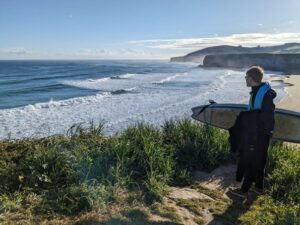
©Jan-Felix Wolters
I had a great time throughout my stay in Valladolid and am very happy to have gotten to know the country, the city and the people. Valladolid is a beautiful city and has much more to offer than one would expect at first glance. It may not be able to compete with Spains major cities when it comes to the cultural offer and nightlife but impresses with a high quality of life, easy access to the nature and a cheap cost of living.
My internship in Bilbao
- Business Administration and Engineering M.Sc. Mechanical Engineering
- Spain, Bilbao
- FEV Iberia SI
- 10.10.2022-15.01.2023
Preparation:
When it comes to preparing for a stay in Bilbao, the most important thing is housing. In general, finding a place to live in Bilbao is not as stressful as in other cities. The best place to look for housing is “idealista”, a Spanish online real-estate marketplace. Prices obviously differ, but finding adequate housing for around 500 Euro/month is possible. Especially, when you can communicate in Spanish and also stay for at least half a year. Also, there are Erasmus Telegram and Whatsapp groups (you can find them on Instagram or in the Internet) where rooms are offered as well. Besides to look for housing, this is also a great way to make first contacts in the city. Another important preparation would be to look for health insurance. I had the luck that it was organized by the company.
Finding an internship:
In my case, I was a working student in the Aachen Office of the company I then worked for in Bilbao. Generally, going for an international company is the easiest way to find an internship abroad and that’s also how most people I talked to did it. Especially, when you are not fluent in Spanish, a regular local company will be tough to convince to take you.
Culture:
Most people have been to parts of Spain before, so I guess a Culture shock is not to be expected in
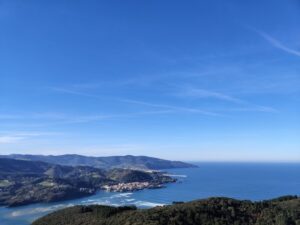
© Lukas Tacke Genannt Unterberg
that case. However, Bilbao is part of the former Basque-county. Even if it is technically Spain, the people are often quite proud of their heritage. Some might take it as an insult, if you call them Spaniards. Additionally, the Basque language is very prominent. You will hear it on the streets and read it a lot on signs. It is very different from Spanish, so don’t be fooled thinking it is just some form of dialect you might be able to understand! All in all I must say, people were very welcoming and most of the time happy to help and communicate, even if there isn’t actually a common language between you. The level of English capabilities is very low in that area, so basics in Spanish or Basque can be very helpful.
Day to day life:
Coming from the culture, food plays a very significant role there. Pintxos (A slice of bread with ANY savory toping you can think of) might be the most prominent one. You can take them for lunch or in the evening with some drinks. Since the city is next to the ocean, fish and other seafoods are integrated in a lot of dishes. If you are a vegetarian or a vegan, it might be hard for you. In more traditional restaurants the vegetarian dish is just a salad or something along that line, so you might want to go to more modern places.
When it comes to going out in the night, Bilbao has a lot to offer. Especially in the casco Viejo (old town) the bar density is very high. But also throughout other parts of the city, you will always find a nice place to grab a beer or a Kalimotxo (popular Basque drink, red wine with cola) and some Pintxos. The club landscape is definitely more restricted. For most clubs, you have to love reggeaton, since it will be played the whole night. But there are also some clubs, where the music choices are more diverse (strong recommend for “Sala Sonora” for Saturdays).
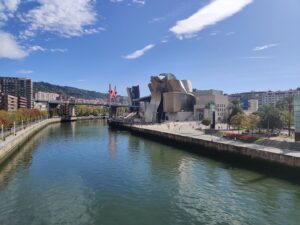
© Lukas Tacke Genannt Unterberg
Public transport is ridiculously cheap and easy in Bilbao. You go to any bigger metro station and buy a “Barik Card”, on which you then can load money. From then on, you just touch-and-go for trains, buses and the metro for prices mostly below 50 cents per ride. The metro also goes all the way to the ocean. Plentzia and Sopella are the beaches reachable by metro I recommend the most. If you want to explore the area, for hikes or to visit other towns nearby, going by bus (Asta or bizkaibus) is a very good option. Most beautiful places I have seen are: San Sebastian, Gangekogorta and the Urdaibai area.
When it comes to work life, in my case it was very similar to my experiences in German companies. Similar working hours, with maybe a longer lunch break and in my case an amazing office climate. My co-workers were always happy to help with tasks or problems at work, but also with recommendations what to do in the area on weekends or which restaurant to go to.
A great experience in Madrid
- Architecture M.A.
- Spain, Madrid
- b720 Fermín Vázquez Arquitectos
- May – October 2022
Living and working six months in the vibrant city of Madrid was a lot of fun for me. I did my obligatory internship in a rather small architecture studio in the northern central part of the city – close to the Bernabeu stadium. I shared a flat with two people in Hortaleza, which is in the north-east between the inner and outer ring, therefore a little bit far from the lively city centre. But it was within a good distance for the everyday commute and for an affordable price. One very important thing to know about living in Madrid is that the public transport system is working really well and if you live close to a metro or cercania station you can move very quickly within the city. If you are under 26 the monthly ticket is more than affordable.
My colleagues at the architecture studio were nice and welcoming. They offered me to speak in English but I asked them to only talk in Spanish with me as I wished to learn as much Spanish as possible during my stay. Even though I did not understand everything on my first days, it did not take long to get used to listening and speaking Spanish all day long. This way I learned a lot and could integrate well in the team. Nevertheless, I would highly recommend a good level of Spanish if you would like to do your internship in Spain.
I have spent the summer term in Madrid to enjoy the nice and hot climate. If I could choose again, I would probably prefer to do an internship of six month in the winter term for two reasons. First, in July and August, it got very hot. Maybe this year has been extreme, but we had a couple of weeks with temperatures above 35 degrees – up to 41 degrees on peak days. Even though every office is supposed to have air conditioning, mine did not because it was broken. As it took until the end of August until someone could fix it, we had to sweat quite a bit. Second, if your office does not make an obligated summer break you are probably to stay while everyone else is leaving Madrid for three or four weeks of vacation. And as people are taking turns, you can find yourself with only very few other co-workers in the office. When everyone came back from vacation, the social life outside the office started to pic up. Not only among the colleagues but also in the whole city. A lot of events happen in autumn in Madrid. So, when the time came that I had to leave, I really did not want to.
Madrid’s social life is inexhaustible. There are always things to do and always events happening. It is almost impossible to find a moment when the streets are empty. Concerning parties, it is probably impossible not to find a bar or club where you can listen to the music you like. You can find all kinds of parties in town. (Even though there is a lot of reggaeton, which was in my favour.) I enjoyed most going out in Cuenca and Malasaña – day and night. Also, even though the river of the city is rather small, Madrid has a lot of parks. I loved spending time at the Retiro Parque and Casa de Campo. But because I lived rather far away from these central parks I often went for a run to Parque Felipe VI. Probably no location where you would go to if you do not live close by, but I liked running there a lot because I had a view of Madrid’s Skyline as well as the mountains in the north of the city. If you search for a nice sunset location, I would not recommend Templo de Debot because it is always too crowded, but rather go to the Lookout at Tío Pío’s Hill.
Madrid is Europe’s highest capital city with about 600m above sea level. I noticed this the most due to the high temperature ranges between day and night. Therefore, it is always recommended to bring at least a light jacket. If you do not need it in the morning, maybe you will need it inside if the air conditioning is too cold.
The last thing that I would like to mention about Madrid is that I appreciated its geographic location within Spain a lot. It is very comfortable to travel from and to Madrid. The distances to all points of interest in all directions are more or less equal. If you book your AVE (the fastest trains in Spain) in advance, it is affordable and allows you to go – sometimes even non-stop – to either Sevilla or Barcelona within two hours. The bus takes about five to six hours depending on traffic conditions.
To put it in a nutshell, I can highly recommend Madrid (and for architects also my studio b720) as Erasmus+ location. I enjoyed the six month there a lot and I hope that I can go back soon. The people I met were wonderful and the food I ate delicious. I have learned a lot in language, professional and intercultural terms.
Toledo- an old city with a lot of Spanish flair
- Biology M.Sc.
- Spain, Toledo
- Hospital Nacional de Paraplejicos
- 04.05.2022-30.09.2022
My name is Anna, and I have been studying at the “Hospital Nacional de Paraplejicos” in Toledo from May to October 2022. I study Biology in my Masters. In the following, I will try to share knowledge with you that will help you to make the best out of your stay.
The preparation for my internship focused on transport, insurance, and housing. For my research internship abroad, I travelled to Toledo by plane. I arrived at the airport in Madrid and travelled from there to Toledo by train. If you do not want to go by plane, you can also go by railway. This takes a little bit longer, but you can combine your travel with some stopovers in other beautiful cities. Further you save some CO2 and secure the additional Erasmus funding for a green travel back home.
The health insurance is very simple. If you didn’t already have one included, you can ask your insurance to provide you with a European health insurance card. Keep in mind that most insurances do not cover rescue or repatriation in case something goes wrong on a hiking trip for example. You should ask your insurance about that.
I started to look for a flat or a room in Toledo approx. one month in advance. I made some visiting appointments for the first few days. During this time, I was living in a guest room in the professor’s house. The apartment search turned out to be very difficult. I tried to find a flat with the website “Idealista”. Many accounts didn’t even answer or other flats where small or dubious. Also, the language barrier was a big problem, due to the reason that the most landlords did not speak English. I would recommend all students doing an internship in Spain, to practice some Spanish before your internship abroad. Without the help of my work mates most of the viewing appointments were not able. Further I would recommend structuring your profile on those websites so personal as possible. If you apply for an apartment, you should always bring some personal stuff inside the texts and maybe take up some points of their advertisement.
After visiting some flats without any success, one of my workmates had the idea to look for a room in a student’s residence. I found a place in the “Residence María Immaculada Toledo”. Here I lived in a single room in the casco of Toledo. The rent for one month was 520 euros including breakfast, lunch, and dinner. This room was only available for 1 month, so I had to look for another flat in the meantime. Happily, I found my perfect flat quickly. It was a shared flat with three other Spanish girls in the age between 25-30. All three of them were as well working in the hospital. The flat was just perfect, with a large living room, a large kitchen, and a swimming pool. It was also near to the hospital, so I could walk every day by foot to the work. The rent here was 250 euros excluding extra costs like water and light.
My first impression of Toledo was impressive. It is an old city with a lot of Spanish flair. Exactly what I had expected from Spain. I applied for a position in the “Hospital nacional de paraplejicos”, to do my practical course of my master thesis there. The hospital and the investigation have their focus on spinal cord injuries. The hospital is very new and modern, and my work collogues were helpful and nice from the first moment on. I really enjoyed the work in the hospital. The willing to help was so large from all my work mates, and they integrated me into their team very quickly. I learned a lot of new techniques important for my further working live. I was working on my own project. Although the working language in the laboratory was English, it turned out to be a little bit tricky to communicate. The English knowledge of most of my collogues was rather bad. On the other hand, my Spanish knowledge was not the best. So I decided to learn a lot of Spanish int the next few weeks. The understanding was getting better from day to day. As well in English, but also in Spanish. Quickly I was able to follow conversations in Spanish and to talk some basic sentences.
With the girls of my flat I made friends quickly. They took me on hiking tours, we all signed in for the gym and they told me how to play padel tennis, a very popular sport in Spain. On the weekends we normally went out together and they introduced me to their friends. They took me to cultural events in Toledo and told me which places are worth to visit. Another positive point is the close distance to Madrid. It is only 30 minutes by train, so you can also explore the capital of Spain on the weekends.
Going to Toledo was one of the best decisions of my life. The “Hospital nacional de paraplejicos” is a great hospital with nice work mates and a great investigation department. On top, Toledo is a nice, typical Spanish city with endless opportunities and a close distance to Madrid. I hope that my short report gave you some insights into these opportunities.
Writing my master’s thesis in Almería, Spain
- Energy Engineering M.Sc.
- Spain, Almería
- German Aerospace Center (DLR)
- March 2022 – August 2022
The Institute for Solar Research, which is part of the German Aerospace Center (DLR), maintains a research site in Almería in the south of Spain. I spent six months at this location to write my master’s thesis.
Preparation and general tips:
I applied for the master’s thesis in November 2021 and received an invitation to an online meeting with my supervisor quite quickly. After I had the acceptance and we agreed on a topic, I applied for the Erasmus scholarship in January 2022. In February 2022, I booked my flight and started looking for an apartment. The apartments and shared rooms in Almería are cheaper compared to Germany. I found my apartment through “idealista” and had support from people who also worked at DLR and already lived in Almería. Since you can find an apartment quickly, you can also move into a hostel for the first few days and start looking locally.
I recommend looking for an accommodation in the Centro (near the bars and restaurants) or in Zapillo (near the beach), because you can get everywhere quite quickly from there. Most of the landlords do not speak English, so you should write your requests on “idealista” in Spanish. From a language course, I already knew some basics in Spanish, but I mostly got by with an online translator. Also, if you start at DLR, make sure you get a rental contract, as you will need it for later registration with the authorities.
Job and everyday life:
Some students had to take the bus to the Plataforma Solar de Almería (PSA) in Tabernas (about 45 minutes). I worked in the office in the center of Almería. It is surrounded by many different tapas bars and restaurants. We made use of this with the colleagues and usually went out during our lunch break. Eating tapas in Almería is comparatively inexpensive.
In the office we communicated in German or in English. In everyday life, however, you need Spanish, because most of the local people do not speak English. Thus, one learns the most important basics quite quickly. If that’s not enough, you can take a language course (there are several language schools in Almería) or participate in the events of the Erasmus Office to find a language buddy.
Almería is a small town but has everything to offer what you need. Plenty of supermarkets, a nightlife and larger shopping centers a little outside. The university is also located a bit outside but is easily accessible by bus. Almería has an airport, but unfortunately there are no direct flights from Germany.
Leisure:
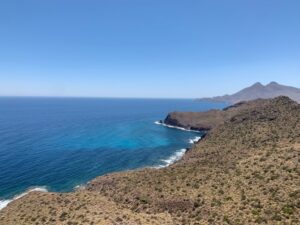
© Rafal Broda
The weather in Almería is great. After work, I often met up with my colleagues from DLR, my roommates or other Erasmus students. We usually met on the beach to play beach volleyball. In the evenings, you can go out for tapas in Almería or go dancing in one of the music bars. I have found that it is quite difficult to socialize with local people, mainly because of the language barrier, but since there are a lot of international students coming to the university, it is overall quite easy to make new contacts. On some weekends we made trips to the nearby nature park Cabo de Gata. There you can hike, snorkel or just relax on one of the many beautiful beaches. I can highly recommend a visit there. On long weekends, you can also take a trip of several days to Granada or Seville to explore Andalusia a bit. From Almería, you can also take a ferry to Morocco. If you are interested, remember to bring your passport.
Conclusion:
Overall, I had a very nice time in Almería. I can definitely recommend doing an internship or thesis at the Institute of Solar Research in Almería. I experienced a lot during this time, met many nice people and improved my Spanish.
Living in Sevilla
- Architecture M.Sc.
- Spain, Sevilla
- Vázquez Consuegra
- April 2022 – July 2022
My internship in Spain was very spontaneous. I applied right before the six weeks deadline and when the Erasmus confirmation came I had only three weeks left to find a flat, book a flight and insurances. I thought that would be an impossible task and almost didn’t try at all. Looking back, I am so happy that I did try! Because everything worked out just fine just as it usually does and after the slightly exhausting organization I had some of the best months so far.
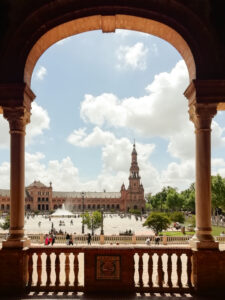
© Smilla Schäfer
Before going to Sevilla, I had this expectation of the Spanish people to be as openhearted and extroverted as I knew it from the South Americans. I was a little shocked to find this to be not very true, at least in my experience. It definitely took some time to figure the people out and make genuine connections and I am very grateful that I had this time!
Where I found this expectation to be true was in my Mexican flatmate. She made the first weeks so much easier for me and I found a great friend in her. During the weekends we would go for trips around Sevilla, for example to Granada, Cadiz Lagos, and during the week for Tapas and Tinto de Verano in the evenings. I am very happy to have met her and cannot wait to visit her in Mexico next year! So, I recommend to not get a flat alone but with flatmates because that is a great way to meet other people that don’t work in the same office.
In the architecture office, in which I did my internship, I met some great people too. The other interns were mainly from Italy and especially with one of them I became good friends. Once a week we would go to our favourite bar, Galeria Taberna Anima, together with my flatmate where they played Flamenco Music every Wednesday. Highly recommend that. Another intern was from Croatia and one week a few friends of hers came with one of her professors from Slovenia to visit her and our office.
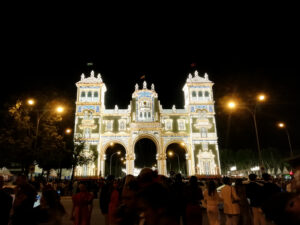
© Smilla Schäfer
This was a very happy coincidence because I connected well with them and now will start my next internship in their office in a few weeks.
So, the thing I am most grateful for are definitely the people I met and the connections I made during this internship!
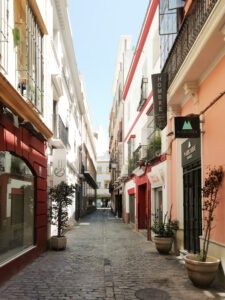
© Smilla Schäfer
But besides that, I also fell in love with Andalucia and Sevilla itself. The landscape with its mountains and beaches is stunning and the culture so rich that there seems to be a different fiesta or feria every other week. I loved to live by this new rhythm – work in the morning, siesta in the evening and going out at night -, I loved the food and how they put olive oil on everything and I even loved the climate, although I am not going to lie, the late July with 46 degrees every day was hard. If you go to Sevilla, make sure your apartment has airconditioning!
Because of the heat the office had a special summer schedule. We would start at 8am and leave the office at 3pm. An exception was the time right before a submission deadline, when everybody had to stay longer but in general everybody left really punctual. Non-negotiable was the coffee break at 11am. The office had no coffee machine, so we left the office to go to the next bar in small groups every day. Very quickly the Coffee and Tostada con Aceite y Tomate became a daily ritual for me and I already miss that.
In conclusion I can say that this internship abroad contributed highly to my professional growth as an architect and allowed me to network with a lot of interesting people but also helped a lot to my personal growth and gave me many great experiences! I recommend taking this chance and just doing it to everyone who might be thinking about it.
Living in Madrid
- Data Science M.Sc.
- Spain, Madrid
- March 2022 – June 2022
My experiences:
Spending some time in Spain as always been on my mind, so I was really happy to finally realize it. I spent about four months in Spain and in the following I will share my experiences about living in Madrid, finding and organizing an internship and my overall personal experience.
I lived in Chueca, which (together with neighboring Malasaña) is a major destination for gastronomy and night life. On the one hand, it is great because it has a lot going on and represents diversity and LGBTIQ-friendliness. It has a central location both for walking to many parts of central Madrid as well as convenient public transport connections. On the other hand, it is expensive and did not really have a neighborhood-like feeling because it is very crowded and to my impression is really anonymous. It offers many fancy restaurants and shopping opportunities, which did not correspond too much to my preferred price segment and atmosphere though.
My favorite neighborhood is Lavapiés which is more multicultural and offers more affordable options for going out. However, accommodation there is also scarce and my recommendation for a flat would be to also consider other areas which are well connected with public transport and which have their own local atmosphere without an abundance of tourists.
As activities, I can recommend hiking and climbing in the nearby mountains. The villages of Cercedilla, El Escorial and Manzanares El Real can be reached with public transport and offer great hiking. For climbing, I was lucky to join a group of climbers of the alpine club of the Autonomous University and could profit from the good atmosphere and the carpooling within that group.
Apart from the outdoor activities and all the museums and interesting places inside Madrid, I also want to recommend doing day trips by train to the cities Toledo, Segovía and Ávila.
Finding and organizing the internship was not so easy because the planning horizons of the companies that I talked to were not clear. For example, I found a company which would have employed me, but in the end there was a shortage of projects in my desired time period. In general, the insecurity due to the pandemic situation made many companies reduce their internship activities. Moreover, I wanted to avoid a pure home office position, which ruled out some start-ups/IT-companies which do not even have office spaces anymore.
Apart from using job platforms, I eventually found my company by browsing through Madrid’s universities, their spin-offs and cooperating research and development institutes. In particular, these are more used to employ interns because in many study programs in Spain there are obligatory internships which seem to have additional funding.
However, in my case, I was the first person to come from abroad and that is why the amount of questions, uncertainties and organizational issues was relatively high. Neither to me nor to my contact person at the institution was clear at the beginning whether I would need to get a NIE (foreigner identification number) or a social security number. As my host institution could pay me a small salary, I eventually tried to obtain a NIE. This turned out very difficult because there were no appointments available at the foreign affairs office and police in Madrid. For several weeks, I checked the corresponding web page daily and could not get an appointment. Even though, I felt to have understood the system (that new appointments are entered into the system on Mondays around 12PM, still the demand by other and technical obstacles where high). In the end, I decided to travel more than 100km to the neighboring province of Ávila (as mentioned above it is a pleasant day out though) and managed to get an appointment and my document there. From then on, the procedures went relatively smoothly (apart from smaller struggles setting up a bank account).
The work itself started smoothly and I felt well-prepared from my studies and previous work experiences. The team met on two days per week in the office, the remaining days I mostly worked from my room.
I worked on data analyses and machine learning model improvements that the team had always had in mind, but could not find the time themselves for. Therefore, my work was on the one hand useful and providing insights to the time, but on the other hand always a bit separated from what the colleagues were doing. Moreover, my actual supervisor was very busy and partly away, so I was somehow not sure who to ask certain things and who decides the next steps, but I recommend to just not hesitate and ask in the group chat etc.
A peculiarity for me was that some colleagues did not have breakfast at home and that the culture of long coffee breaks (including breakfast) is imported. My colleagues worked rather long hours, but still did not let them stress too much and I appreciated to have a good and social atmosphere.
My overall experience was positive, however, it was more difficult than expected to get socially involved. This is the disadvantage of a big city and that people in my case are having their routines and private lives. In my case, sports and university associations were the solutions to get to know people. In total, I leave Madrid with some positive memories and rich in experiences, however looking forward to environments with more close people and friends.

